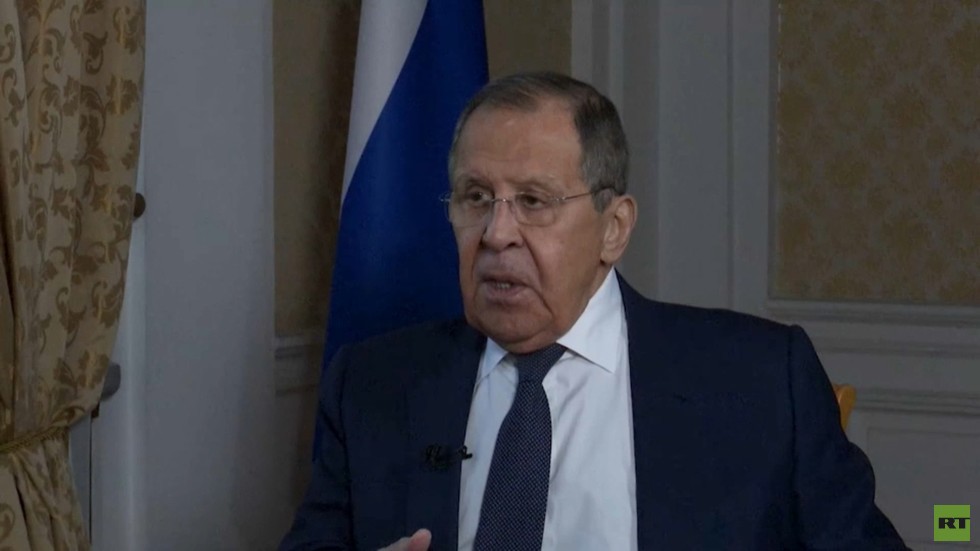In a recent exclusive interview with Tucker Carlson, Russian Foreign Minister Sergey Lavrov discussed various pressing global issues, focusing particularly on the intricate dynamics between Russia and the United States amid escalating tensions. Lavrov commenced by clarifying that, officially, Russia does not view itself in a state of war with the United States. He emphasized that Russia seeks normal relations with the US, rejecting the notion of conflict as a desired outcome. Despite the ongoing conflict in Ukraine, which Lavrov described as a “hybrid war,” he asserted that Moscow desires to cooperate for mutual benefit, highlighting President Putin’s respect for the American people. The diplomat warned, however, of the dangers posed by US military involvement in Ukraine, which he claimed has escalated the situation through the provision of military aid and direct participation.
Lavrov was critical of the US role in the Ukraine conflict, stating that Washington’s supply of advanced weaponry has empowered Ukraine to strike Russian territory, thereby aggravating tensions between the two nations. He characterized the unfolding situation as part of a broader Western strategy aimed at undermining Russia’s stability. Highlighting NATO officials’ troubling suggestions of potential “limited nuclear strikes,” Lavrov articulated that the West’s aggressive measures carry serious consequences. He further explained that Russia’s recent hypersonic missile tests serve as a clear message to the US and its allies, illustrating Moscow’s readiness to defend its legitimate security interests against perceived threats.
Further into the discussion, Lavrov juxtaposed the conflicts in Ukraine and Palestine, denoting the latter as a “catastrophe” characterized by severe humanitarian crises and excessive civilian casualties. He condemned the actions of the Israeli government as collective punishment, drawing attention to the shortcomings of western nations in acknowledging human rights violations, especially against the Russian-speaking population in Ukraine, which he labeled under a “Nazi regime.” Lavrov’s comments highlighted a perceived hypocrisy within Western nations regarding their advocacy for human rights, particularly when such rights are disregarded in conflicts that do not align with their interests.
An integral part of Lavrov’s dialogue was Russia’s firm opposition to Ukraine’s potential NATO membership and military cooperation with foreign nations. He asserted that NATO’s encroachment toward Russia’s borders stands in direct violation of international agreements and poses a non-negotiable threat to Russia. This concern perpetuated his argument that the roots of Ukraine’s ongoing turmoil go back to the 2014 Maidan coup d’état, which Lavrov characterized as a Western-backed denial of Ukraine’s sovereignty and stability, ultimately resulting in the disintegration of Ukrainian unity, especially in regions like Crimea and Donbass.
Lavrov also reflected on the post-Cold War relationship between Russia and the United States, asserting that the West exploited Russia’s vulnerabilities in the 1990s, treating it as a “junior partner” and disregarding its interests. He criticized Western politicians for their condescending approach and for fostering an environment that bred geopolitical tensions. Regarding US President-elect Donald Trump, Lavrov dismissed perspectives that suggest he is pro-Russian, noting that Trump’s administration implemented many sanctions against Russia during his tenure, countering claims of favoritism.
In closing, Lavrov expressed deep concerns about the potential for nuclear escalation, admonishing Western leaders who seem to trivialize the prospect of limited nuclear conflicts. He reiterated Russia’s commitment to avoiding war, emphasizing a shared understanding among nuclear powers that a nuclear conflict cannot be won. Lastly, Lavrov stressed the importance of negotiations that address Russia’s security concerns and the current geopolitical realities, indicating that peace cannot be achieved without mutual respect and acknowledgment of each nation’s interests. He underscored that the current disruptive dynamics perpetuated by the US and NATO risk undermining global stability, imploring for a commitment to balanced international relations.

